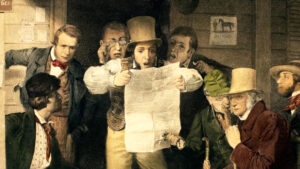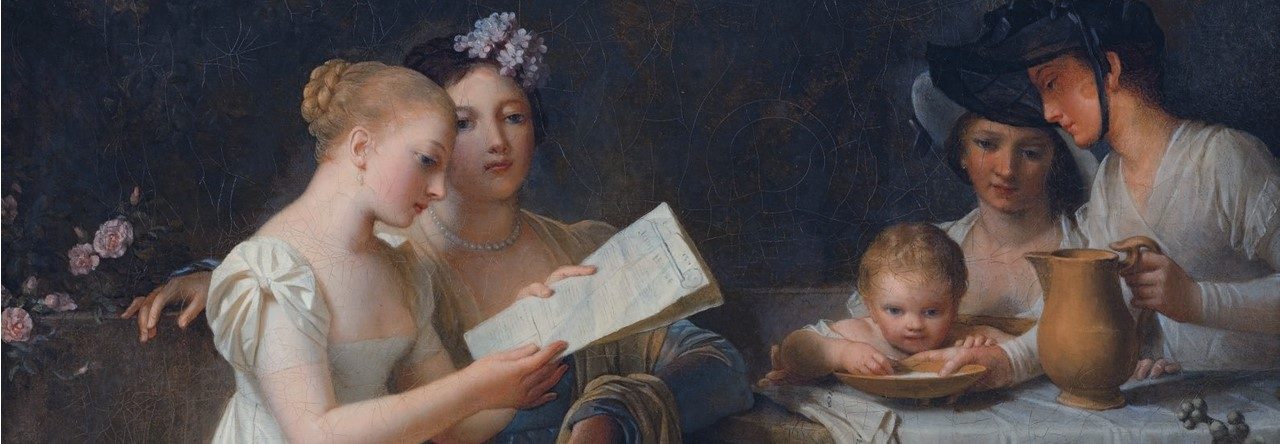
Dearest Readers,
Readers of this regular missive are certainly aware of other purveyors of news related to the Bon Ton. The Lady’s Newspaper and Pictorial Times, for example,  or Fraser’s Magazine for Town and Country. Those of genteel breeding, however, may not be aware of the existence of single-sheet items printed hurriedly and sold on the streets cheaply for a penny or halfpenny, perhaps because they deal with issues of politics that many ladies do not concern themselves with.
or Fraser’s Magazine for Town and Country. Those of genteel breeding, however, may not be aware of the existence of single-sheet items printed hurriedly and sold on the streets cheaply for a penny or halfpenny, perhaps because they deal with issues of politics that many ladies do not concern themselves with.
However, a rumor has arisen that a member of the gentry may be behind one of these scandalous sheets. This man calls himself Janner, which is a name for an English person born within ten miles of the sea, and though his ideas may be controversial his language and ability to express himself reveals that he is a man of great education, perhaps a graduate of one of our finest universities.
Janner takes up a variety of causes, from the support of bills in Parliament governing the labor of women and children in factories to the plight of boys who work delivering goods to our very homes from vendors we might otherwise hold in esteem.
His fervor is that of a young man, and enquiring minds are curious to see if he can be matched to anyone from a seaside background with an excellent education. Certain names have arisen, most specifically Lord Tyne and Lord Therkenwell, who both hail from Cornwall.
Those who encountered Lord Tyne during his sister’s season may have reason to doubt his ability to form such elegant sentences. Which leaves Lord Therkenwell, who shares a dwelling in Eaton Square with a gentleman employed by the French embassy. This somewhat louche arrangement results in two eligible bachelors who are rarely seen in the company of women.
These particulars, as well as the fact that Therkenwell has taken a more public stance on issues now that his father, Earl Badgely, is less active in the House of Lords, leads your correspondent to make a connection between Janner and the Cornish lord.
How does this relate to the readers of this publication? Recently Janner has taken a position on the pay and working conditions of household staff! And that should concern any lady who wishes to maintain a proper home—especially on a budget. We shall keep abreast of these issues in the future, and whether we can expose Lord Therkenwell as the author of these missives.
***
Janner Excerpt, The Lord and the Gentleman
Ahead of him he spotted a young boy selling broadsides. He hurried closer to see if it was the latest Janner. And indeed as the boy called out the headline, he recognized it. He felt warm inside—until a portly man in a heavy overcoat grabbed one of the pages from the boy without paying.
“Here, mister, that’s a penny,” the boy said.
The man glanced at the headline. “I don’t pay for trash!” he said.
When the boy grabbed for the paper, the man pushed him, and John felt obliged to step in. “It is theft to take something without paying for it,” John said. “Either return that page to the boy or pay him, or I will call the bobbies on you!”
The man turned on him, his mouth a snarl. Then his eyes opened. He looked at John, taking in the cut of his topcoat, the ruffled sleeve that stretched over his wrist. “A molly, are you?”
“Even I were, I would have no interest in such as you,” John said coldly. “A pork pie stuffed in a sausage casing, and a thief to boot. I reiterate, sirrah. Give the boy his coin or his paper.”
Huffing, the main pulled a coin from his pocket and handed it to the boy. He folded the paper under his arm.
John tipped his hat and said, “Good day.” Then he turned and began to stride back toward Russell Square, his heart beating rapidly. The nerve of the man, a commoner in cheap clothing, to insult him, a member of the gentry. Usually his outrage led him to write as Janner, so when he got home, he pulled down an empty notebook from his shelf and wrote out the incident, indicating, time, place and what the man was wearing. Those details would be useful at some point, he was sure.
As he closed the book and put it back on the shelf, he wondered if other boys suffer the same conduct when selling his work? The idea remained with him, and became the substance of the next Janner broadside, about the value of work. Regardless what readers might think of broadsides, they were the result of work by writers, editors, printers and salesboys, and each of them deserved to be compensated. To snatch away a page, as the man had done, was a theft against all involved in the production.
He worked all week on this essay, taking quick trips out to spy on the salesboys and see if anyone else tried to take advantage of them. He witnessed hectoring and even one man who spit, and he used those examples as well.
By the time Saturday night arrived, when he had an invitation to a soirée at the home of Lord Dawson and the man he shared a house with, Toby Marsh, he was tired. He was still angry about the injustices perpetrated against the salesboys, and unhappy over his father’s demand that he head to Shorecliff.
“I don’t know if I shall go out tonight,” he said to Beller as evening darkened.
“You have worked hard this whole long week, my lord,” Beller said. “See how ink-stained your fingertips are? They are a mark of your industry. Whether you go out or not you must let me work on them.”
John sat at the small table in his kitchen. Beller sat across from him with a bottle of rubbing alcohol and a worn cloth, and John stretched out his right hand. Beller grasped it with one hand and used the other to brush aggressively against the ink stains.
“You take very good care of me, Beller,” John said, even as his fingertips stung against the abrasion.
“God calls every Christian to glorify him in our work,” Beller said. “According to Saint Luke’s account in the Bible, Mary Magdalen washed the feet of Christ with her tears at a banquet in the House of Simon.” He looked up at John with the hint of a smile. “At least I may use rubbing alcohol instead of my tears.”
John laughed. “You are a rogue, Beller,” he said. “And that is why I enjoy your company so much.”
“And I yours, my lord.” When he finished cleaning John’s fingers, he said, “and now, are you ready to reward your hard work with some entertainment?”
John smiled. “I am, my good man. Thank you. Shall I wear the tweed suit?”
“I think it is appropriate for the January cold,” Beller said. “With a wool scarf and top hat, and your greatcoat over it.”
Once Beller had completed John’s ensemble, John struck out for the walk to Ormond Yard. The night was chilly but clear—or as clear as sooty London could be. He even managed to spot the North Star above him, though it was quickly eclipsed by wafts of smoke coming from chimneys he passed.
Cornwall in February would be quite dreary, he thought, as he turned onto Great Russell Street, past the enormous pile of the British Museum. It was closed, of course, but he gave a nod toward the Egyptian sculpture gallery, one of his favorites. When he came down to London occasionally from Cambridge, he had often strolled through those galleries, peering at the Rosetta Stone as if it could decipher his future for him.
He had so much good fortune in his life, he thought. An allowance from his father that enabled him to live in comfort, his writings as Janner that gave him a purpose. He had Beller for companionship and service. Though he longed for a male companion he had to resolve to continue until such a man arrived in his life.
Two elderly men passed him, one holding the other by the belt so he would not topple, and John tipped his cap at them and wished them good evening. Seeing their connection made him smile all the way to Ormond Yard.
***
The Lord and the Frenchman, blurb
Two wounded men discover true love and a found family in Victorian England
In the opulent courts of Victorian England, John Seales, Lord Therkenwell, is a man of wealth and privilege, expected to marry a woman of his own social standing and produce an heir. But when he meets dashing French diplomat Raoul Desjardins at a soirée arranged by a politically-connected gay couple, he finds himself inexplicably drawn to the man despite the risks of their forbidden love.
John and Raoul struggle to keep their feelings for each other hidden while becoming ensnared in a web of international intrigue that threatens to ruin their careers and endanger their lives. As they navigate the dangerous political landscape of the time, they must also confront their own demons and make a choice: follow the expectations of society or follow their hearts. Set against the backdrop of a tumultuous era, “The Lord and the Frenchman” is a passionate and romantic tale of love that knows no bounds.
Genre: MM Romance
Length: 81,000 words
Publisher: Samwise Books
All formats available
Release date: February 14, 2023
https://www.amazon.com/Lord-Frenchman-Ormond-Romantic-Adventures-ebook/dp/B0BSH6ZL4N/
https://books.apple.com/us/book/the-lord-and-the-frenchman/id6445491482
https://www.kobo.com/us/en/ebook/the-lord-and-the-frenchman
https://books2read.com/u/4DJyJe
Neil Plakcy, author bio
Neil Plakcy is living his own happily ever after with his husband and two rambunctious golden retrievers in South Florida, where he is a professor of English at Broward College. He has been a construction manager, a computer game producer, and a web developer – all experiences he uses in his fiction.
He has written or edited over fifty novels and short stories in gay romance, gay mystery, cozy mystery and erotica. His research has taken him from the FBI’s sixteen-week citizen’s academy, where he practiced at a shooting range, to visiting numerous gay bars in Miami Beach and Fort Lauderdale. (Seriously, it was research.)
His website is www.mahubooks.com


Leave a Reply